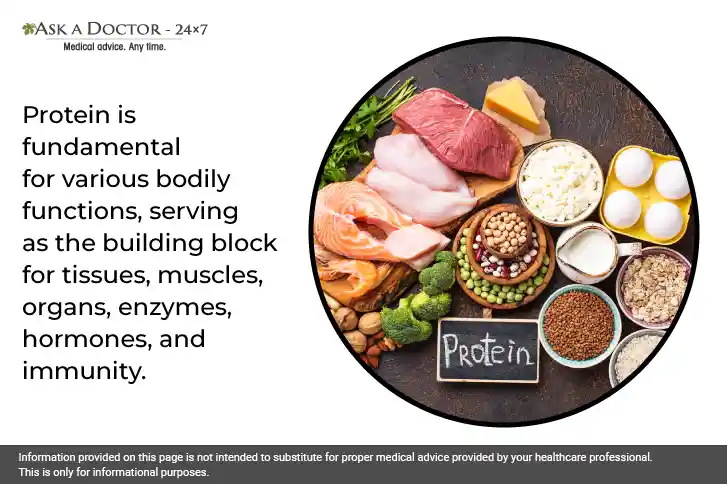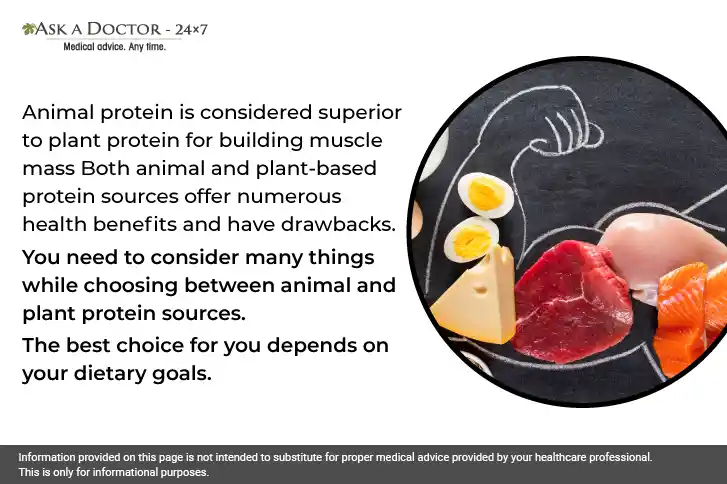Animal Protein Vs Plant Protein: Which One Is Better And Why
What pops into your head, when you think of protein-rich food, eggs or meat? Yes, these are good sources of protein but not the only ones. Protein sources vary greatly and are found in both animal and plant-based foods. Protein is one of the macronutrients your body needs to build, repair, and maintain body tissues. Protein supports energy levels, regulates hormones, and makes enzymes.
Proteins are large, complex molecules made up of amino acids. The human body requires about 20 amino acids to make new proteins and other compounds, nine of which are essential. This means the body can not produce them, and you need to get them through your diet. Now the question that pops up again is - which protein should I choose? The animal-based or plant-based protein? Read this blog until the end to know which option is better; and about protein's role in body functions and growth...
What are the Benefits of Plant and Animal Based Proteins?

Protein's nutritional value is measured by the quantity of essential amino acids within a protein source. You must eat enough high-quality protein every day to keep your body healthy.
Plant-based proteins
Plant proteins provide plenty of nutrients. Plant-based proteins do not contain all essential amino acids but combining different plant foods helps meet your body’s needs.
Benefits of taking plant-based proteins:
Plant proteins are rich in many nutrients and offer multiple benefits including:
- Enhances gut health. Plant proteins are rich in soluble and insoluble fiber that stimulate digestion and promote regular bowel movement. Fiber helps in nutrient absorption and maintaining overall well-being.
- Rich in antioxidants. Most plant proteins such as those found in beans, lentils, and nuts are packed with vitamins and phytochemicals such as flavonoids and carotenoids. These antioxidants protect the body from free radicals and lower the risk of inflammation and chronic diseases.
- Good for your heart health. Plant-based foods are rich in heart-healthy nutrients like omega-3 fatty acids, potassium, and magnesium and low in unhealthy fats and cholesterol. Plant-based proteins such as beans, nuts, and seeds help to lower your blood pressure and reduce inflammation.
- Helps in managing weight. The fibers in plant protein make you feel full for a long time. Thus reducing the risk of overeating and thus, losing weight.
- Building muscle mass. Plant protein foods such as quinoa, soy, and hemp seeds are rich in all essential amino acids required for muscle repair and growth. Along with regular exercises, these proteins help in building muscle mass.
- Lower risk of type 2 diabetes. Plant-based proteins such as legumes, nuts, or seeds have better glycemic index and lower insulin resistance. Soluble fiber slows sugar absorption and helps improve blood sugar levels. Thus, lowering the risk of type 2 diabetes.
Good sources of plant-based protein include:
- Legumes: beans, peas, chickpeas, lentils, soy, edamame
- Grains: oats, farro, barley or quinoa
- Nuts: peanuts, almonds, pistachios
- Seeds: sunflower seeds, chia seeds, sesame and hemp seeds
- Soy: edamame, tofu, tempeh or whole
Animal-based proteins
Animal proteins include products from animals and byproducts such as eggs and dairy. Animal proteins are considered complete proteins as these provide all the essential amino acids your body needs. Animal products provide the highest-quality protein sources.
Benefits of Taking Animal Proteins:
- Building muscle mass. Animal proteins are better than plant proteins in building muscle mass as they contain all the essential amino acids. Animal protein is higher in the amino acid leucine which helps in muscle recovery after strenuous exercise and stimulates new muscle growth.
- Higher digestibility and bioavailability. As per the protein digestibility corrected amino acid score (PDCAAS) and the digestible indispensable amino acid score (DIAAS) animal protein sources have better digestibility. Amino acids in animal protein survive digestion better than plant sources and thus better bioavailability.
- Lower risk of heart disease and diabetes. People who ate more low-fat sources of animal protein such as poultry and fish instead of red meat have a lower risk of having heart diseases or type 2 diabetes
- Better weight control. Plant-based proteins are less protein-dense than animal foods, meaning that individuals need to eat a larger quantity of plant-based foods in comparison to animal protein. Thus animal proteins help in managing weight by promoting satiety and reducing appetite.
- Rich in nutrients. Animal proteins are rich in important nutrients such as vitamin B12, a type of iron called heme iron, calcium, and omega-3 fatty acids. These are vital for brain health, red blood cell production, and immune function.
- Decrease muscle loss with aging. Animal proteins increase lean muscle mass and reduce muscle loss that occurs with age.
Good sources of animal-based protein include:
- Red meat
- Fish and seafood
- Eggs and poultry
- Milk, yogurt, cheese, and other dairy products
- Wild game
Which Is Better Animal or Plant Based Proteins?

Animal proteins are considered complete, containing all essential amino acids while no single plant source contains all amino acids, but all can be found in plants. You have to eat more than one type of plant to get them all.
Both animal and plant-based protein sources offer numerous health benefits and have drawbacks. You need to consider many things while choosing between animal and plant protein sources. The best choice for you depends on your dietary goals.
Plant proteins
- These are low in saturated fats and cholesterol as compared to animal protein sources, thus making them heart-healthy. Researchers have found lower body weight, lower cholesterol levels, and lower risk of stroke, cancer, and death from heart disease in people eating plant-based protein than people who eat more red meat or processed meat.
- Plant proteins are packed with essential nutrients, including vitamins, minerals, and phytonutrients, etc., that are essentially required for overall health and well-being.
Animal proteins
- These are good for building strength and muscles and are comparatively more easily digested and absorbed in the body than plant protein. This means you may not get as much protein from your plant source.
- Animal proteins help in managing weight by reducing appetite while plant proteins are less protein dense and you need to eat larger quantities to meet dietary requirements.
Both animal and plant proteins differ in composition and affect health differently. For nutritional adequacy, you can eat both plant-based and animal-based protein sources. To ensure you are getting your recommended protein intake, eat different varieties of foods. To learn more about protein intake and get personal guidance Ask an online Nutritionist at Ask a Doctor 25x7.
Recently Answered Questions Related to Protein-Rich Diet and Good Nutrition
- Is Consuming 180 Grams Of Protein Per Day Safe?
- Is Whey Protein Powder Good For Health?
- Regular Gym, Protein Diet, Chest Pain After Consuming Protein Products
- How Much Protein Is Recommended For A 30-Year-Old Male Weighing 200 LBS?
- Can Protein Shake Cause Allergy?
- What Causes Elevated Protein Levels In Urine?
- Protein-rich diets Help Lose Weight.
- When I Drink Anything (water, protein Shake, etc.) I feel Uncomfortable In My Chest
Disclaimer: Information provided on this page is not intended to substitute for proper medical advice provided by your healthcare professional. This is only for informational purposes.
Ask a Specialist
Recent Questions


